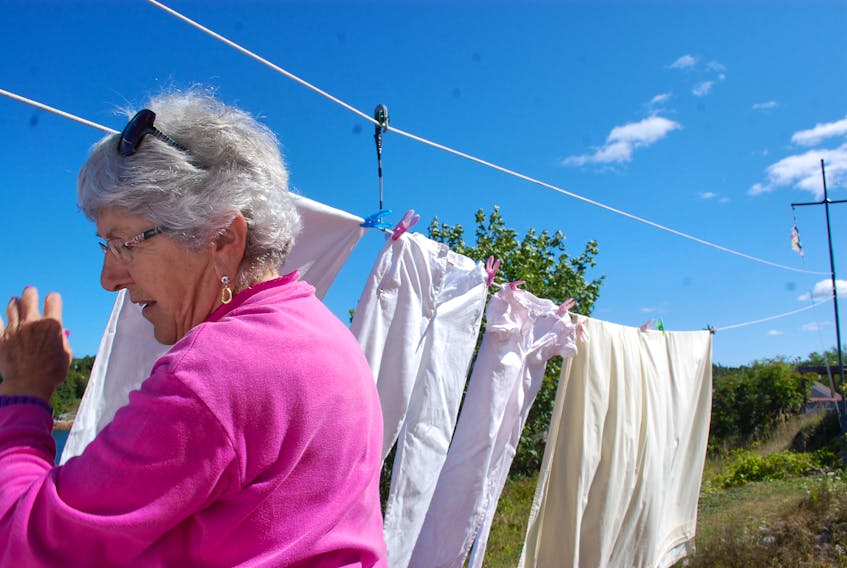LITTLE BAY ISLANDS, N.L. — Residents of Little Bay Islands are one step closer to knowing the fate of their community.
After months of back and forth over who qualifies as a resident and can therefore vote on the resettlement question, those who appealed the decision on their status have been getting their answers.
“The community is still digesting it,” Coun. Chris Weir told The Central Voice Oct. 24. Despite his position on council since 2014, he was not deemed a full-time resident of the community in the original assessment, released in February. He learned the decision had been overturned around the same time as others in the community got their own results, Oct. 15.
Despite this step forward, however, Weir says the process is still taking too long.
“I still think it’s a debacle, I really don’t know what the government has done here,” he said. “It’s an issue that should have been resolved many, many months ago, put closure to the fact. It hasn’t been done. It seems like they’re dragging their heels on it, and I’m not sure why they’re dragging their heels on it.”
Past v. present
The saga of the potential resettlement of Little Bay Islands has made headlines for years. Media the likes of The Globe and Mail, The National Post and The New York Times have made the trek to the island in Notre Dame Bay – a mere 30-minute ferry ride from Pilley’s Island. The Central Voice made its own pilgrimage in early September.
“What’s happening in Newfoundland is really no different than anywhere else,” said Ray Flynn, a summer resident of the island who has lived in many provinces over the course of his life. “In Newfoundland, it was the fishing. This was a major fishing centre, but after the war, everything changed and it’s been going downhill ever since.”
Little Bay Islands has about 120 homes, though some stand empty. There used to be more scattered throughout the island’s coves, but as time wore on and fishing was no longer sustainable as a purely family-run operation, people moved into the town, clustered around a protected harbour.
“Little Bay Islands is paradise.”
-Doris Tucker
The 2016 census recorded 61 residents, though last year less than 40 stayed over the winter. There are only a handful of residents under the age of 60.
The government is offering $250,000 for a single person, and up to $270,000 for a family, to relocate. As a result of a policy change in 2016, this would not see the government take possession of people’s homes, but rather is meant to help people start somewhere else.
Flynn is originally from Harbour Main but married two women from Little Bay Islands and now spends his summers there with his second wife, Doris Tucker, in her brother’s former house. They too had appeals filed for their residency status. He also has little faith in the government coming to a speedy decision when it comes to resettlement.
“People like Doris and I, it don’t matter a lot to us because we come in the summer, we go down south in the winter, and we got a home in St. John’s,” he said. “The sad part is there are a number of elderly people who don’t have a vehicle of their own, and health care is a major problem. Just to go to Springdale on the ferry, if you have to get a taxi it’s $70, just to go to the drugstore.”
In the Oct. 2015 vote that fell half-a-percentage shy of the 90 per cent required for resettlement, Flynn cast a ballot in favour of the measure. Not for himself, he said, but for his friends and neighbours.
“If they ever did another vote, I’m not sure which way I’d go,” he said.
Though they do have a house in St. John’s, in Paradise to be precise, Tucker knows where she calls home.
“That’s not paradise,” she said. “Little Bay Islands is paradise.”
On her patio overlooking the harbour on a warm but breezy day, over a full service of tea, she recounted pieces of her life. She went to school on the island until Grade 10, before leaving to pursue a career in nursing that took her to Montreal for the better part of three decades. She visits the city once a year to reconnect with old friends and colleagues. Nursing seems to have been a popular choice for the community’s women in terms of work. The other option, Tucker explained, was teaching.
The school has not had any students for some time now. With a dwindling and aging population, there is not enough of a tax base to pay for all the services a municipality would normally expect. Still, Tucker said that despite only living in the community in the warmer months, she pays her bills for a full year, like everyone else.
“I can understand it, but what I say is everybody has a right to vote for what they want,” she said. “As long as you’re not paying my bills and I’m not abusing children, get out of my face. Because I can vote the way I want, and you can vote the way you want. It’s entirely up to each individual. I have worked very hard for what I have.”

A practical approach
That democratic process, however, seems to have been somewhat stalled.
Dennis Budgell is one of the year-round residents who has staunchly supported resettlement. He is from elsewhere in Newfoundland and has lived for 48 years in his wife’s hometown. He said he doubts anything will happen before next year’s election, and is even doubtful there will be much movement after that, regardless of which party controls the provincial legislature.
“I’d like to see it come back that everybody is qualified,” he said of the appeals process. “Everybody, everybody. We’ll soon find out how much $250,000 counts, because I’m gonna tell you, they’re going to grab that, that fast.”
Budgell’s concerns about staying on the island are practical. There is no doctor and medical care requires a trip on the ferry, if it is indeed running in bad weather, to say nothing of emergency needs. While there is an honour-system commissary of sorts (affectionately called Wharf-Mart) that supplies things like chips and ice cream, there is no store or pharmacy.
“It can be fun, but it can be f**king boring here,” he chuckled. “And most of the time it’s boring.”
Budgell said he and his wife have family elsewhere they would like to see more, something they would be in a much better position to do not living on Little Bay Islands and if they had a bit more money to spare at the end of each month. Though he also noted that $250,000 doesn’t go as far as some may think, depending on the location of a new home.
“I certainly do believe that the people deserve better than what they’re getting here on the island from government.”
-Dennis Budgell
More than anything, however, he just wants it done.
“If we stay here, things are going to change a lot, and government knows it’s going to change because we’re going after them left, right and centre,” he said. “We wants our doctor’s office back. If someone wants to start up a business, a little store, we wants the government to give them breaks on using the ferry, make it so they don’t pay nothing. Anything that helps our community.
“I certainly do believe that the people deserve better than what they’re getting here on the island from government.”

The trouble with waiting
After years of debate and only halting steps towards a resolution, the wait is taking its toll.
It’s no secret that families and neighbours are divided in opinion about what should become of the community, and resettlement has joined the ranks of politics and religion in not being good conversation for polite company. But there are other consequences beyond an undercurrent of acrimony.
“It is difficult. I needed a roof on this house, but was I going to pay money for that if I was going to have to walk away from it? I decided to go ahead, because a roof is important,” said Carolyn Strong, daughter of the family that pretty much ran the community in its heyday.
“It’s not dead. Not by any means, but there are people who think it is."
-Carolyn Strong
“That’s the bad side; that we don’t know. I leave here in a couple of weeks and I don’t know if I’ll be back. How am I going to get here? How soon is it going to happen? I have days like that.”
The Strongs were once so important on the island their company scrip functioned in lieu of government currency. The house with the new roof is filled with pieces of that history; photos and clippings of advertisements dating back decades hang on the walls and rest on a multitude of shelves. On the surface layer were strewn Strong’s sewing projects, hauled out in September after a summer of other activities.
“I’m here, I don’t stop,” she said. “I have people come to the door, I have a lot of friends who bring friends, I have family who bring friends. I have two houses pretty much full all summer. There’s always so much to do.”
“Yesterday was the first day I had nothing to do, really.”
This summer was the third in a row a flotilla came through town in memory of an American soldier. What started as a potluck with 20 or 30 people turned into a massive kitchen party after a few francophones found each other and didn’t want the night to be over.
In early October, a cruise ship made a stop in the community. A hundred people disembarked and were ferried to shore in zodiacs to spend the day hiking and soaking up what many from the mainland picture when they think of this province – all deep accents and laundry flapping on clotheslines.
“It’s not dead. Not by any means, but there are people who think it is,” Strong said. “It’s very quiet. They miss the life that used to be here. It’s not here now, but you move on and other things take its place.”
After her husband died, Strong knew she wanted to come home, at least for the warmer months. The rest of the year she spends largely in Ottawa, where her family lives.
“I can see both sides, 100 per cent. I’ve lived here, and they are my friends. I understand that they want to go and get on with their lives, and I have a bit of both. I think a lot of us have a bit of both.”
-Carolyn Strong
“It’s not that we’re anti-resettlement, because the ones who really want to go, who can’t go on their own, should be helped,” she said.
“I can see both sides, 100 per cent. I’ve lived here, and they are my friends. I understand that they want to go and get on with their lives, and I have a bit of both. I think a lot of us have a bit of both.”
For now, Strong has resolved to make the most of her time on Little Bay Islands. Unlike other summer residents who have plans to come back for the season in the event that services are indeed cut off, she said she would probably not follow.
“I thought I’d have five years here, and this is my 12th summer,” she said. “Some things you can’t put a dollar sign on it. If I have to walk away from it, I have to walk away from it… I have to enjoy each day as they come.”
Next steps
Now that the 35 appeals determinations (cases can be individuals or couples) have been delivered, there are several ways this could go next.
Residents unhappy with their determination may choose to take further legal action, though as of Oct. 30, a statement from the provincial Department of Municipal Affairs and Environment confirmed there had not been any judicial requests filed. They also confirmed that 24 determinations were upheld and 11 overturned.
The provincial government will now embark on a cost/benefit analysis involving multiple departments to see if the cost of resettlement outweighs the cost of keeping the community running. There is no timeline set for when that study might be completed. The previous estimate from March 2017 put the cost savings associated with shuttering the community at $3.8 million over 20 years. That will now change as a result of the 11 determinations that were overturned.
“If that means there’s going to be relocation, fine, it’s going to happen. If it’s not, fine, let’s move on. What we have now is a town that’s in limbo.”
-Chris Weir
Depending on the results of that assessment, the government may ask eligible Little Bay Islands residents to vote again to decide whether or not they want to resettle.
A municipal election was held in late September on Little Bay Islands. Weir was re-elected and said in his previous term there were only four members. This time around, 10 or 11 people ran and seven will now serve on council. A factor in the reinvigoration of local politics was the resettlement question.
“We want this put to bed, and as I said to you earlier, regardless of whatever side of the fence you are on, on Little Bay Islands, the majority of the individuals out here want an end put to this one way or another,” he said.
“If that means there’s going to be relocation, fine, it’s going to happen. If it’s not, fine, let’s move on. What we have now is a town that’s in limbo.”
- Want in on the debate?
- Write us a letter to the editor and email it to [email protected]. Be sure to include a name, address and daytime telephone number where the author can be contacted. Letters should be no more than 300 words.
RELATED:
Little Bay Islands still waiting for word on resettlement (2014)
Residency determination reveals 38 permanent residents in Little Bay Islands









